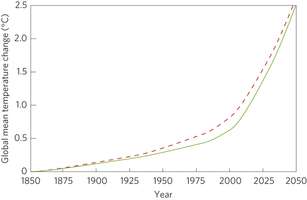March 10, 2014 report
Climatologist challenges low-end claims of Intergovernmental panel

(Phys.org) —Drew Shindell, a climatologist and ozone specialist with NASA's Goddard Institute for Space Studies, has published a Letter piece in the journal Nature Climate Change challenging the findings of an intergovernmental panel that last fall concluded that average global temperatures are likely to increase by a minimum of 1.0°C over the next 70 years. Shindell claims the panel misinterpreted some important data which he says, if used correctly, would actually show a minimum rise 1.3°C over the same time period. In an accompanying News & Views piece, David Stainforth of the Grantham Research Institute on Climate Change and the Environment, London School of Economics, backs up Shindells claims and suggests that it's important that data used in creating projection models be as accurate as possible as such models are becoming increasingly important to policy-makers.
Last September, the Intergovernmental Panel on Climate Change (made up of climate experts from around the world) issued a report suggesting global warming may not be happening as quickly as some have thought, due to another type of pollution that causes temperatures to lower: aerosols. They noted that aerosols prevent heat from the sun from reaching the ground, thus reducing planet wide warming. Shindell agrees that aerosols do indeed lead to cooling but notes that the panel failed to recognize that such cooling only occurs around large cities, thus, it's not a global phenomenon, and thus it can't be presented as such in computer models. He claims that if adjustments are made to existing models, it would mean a minimum increase in global temperature of 1.3°C over the next 70 years, not 1.0°C . That small difference, most climatologists would agree, would be quite significant as it would likely represent bigger changes in weather patterns such as an increase in the number and strength of storms in some places and droughts in others.
Stainforth notes that as global warming has become accepted by most scientists around the world, those who make policy decisions have begun to take the issue more seriously. That means, he adds, that experts in the field need to be more careful when making estimates or predictions, because policy decisions might be riding on what is claimed. In the case of the discrepancy between the finding of the Intergovernmental panel and Shindell, it could mean major differences in how governmental entities plan for coming changes and how funds are allotted.
More information: Inhomogeneous forcing and transient climate sensitivity, Nature Climate Change (2014) DOI: 10.1038/nclimate2136
Abstract
Understanding climate sensitivity is critical to projecting climate change in response to a given forcing scenario. Recent analyses have suggested that transient climate sensitivity is at the low end of the present model range taking into account the reduced warming rates during the past 10–15 years during which forcing has increased markedly. In contrast, comparisons of modelled feedback processes with observations indicate that the most realistic models have higher sensitivities5, 6. Here I analyse results from recent climate modelling intercomparison projects to demonstrate that transient climate sensitivity to historical aerosols and ozone is substantially greater than the transient climate sensitivity to CO2. This enhanced sensitivity is primarily caused by more of the forcing being located at Northern Hemisphere middle to high latitudes where it triggers more rapid land responses and stronger feedbacks. I find that accounting for this enhancement largely reconciles the two sets of results, and I conclude that the lowest end of the range of transient climate response to CO2 in present models and assessments7 (<1.3 °C) is very unlikely.
Journal information: Nature Climate Change
© 2014 Phys.org




















